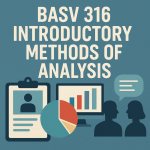
Chapter 13: Unobtrusive Research
This podcast explores unobtrusive research methods, which involve gathering information without directly interacting with the people being studied. The hosts explain how these techniques allow researchers to examine the “traces” people leave behind, providing insights that might not emerge through direct questioning. The conversation covers three main approaches: content analysis (systematically examining texts and media), analyzing physical traces and artifacts (studying tangible objects people create or leave behind), and using existing data collected by others. The hosts discuss the strengths of unobtrusive methods, including eliminating reactivity bias, cost-effectiveness, and the ability to study historical trends or sensitive topics. The episode addresses how digital technology has revolutionized unobtrusive research through social media analysis, digital ethnography, and big data. The hosts explain techniques for ensuring reliability and validity when using these methods and discuss how combining unobtrusive approaches with other methods like surveys or interviews can provide more comprehensive understanding. Throughout, they use concrete examples to illustrate how these detective-like approaches reveal patterns in human behavior. This podcast was generated using NotebookLM.